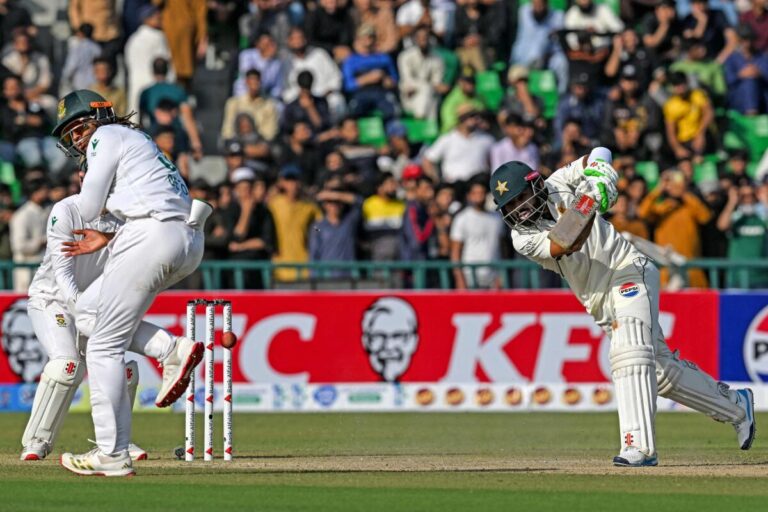Cricket should unite a nation, not put lives at risk. Given the escalating violence in Lahore, growing political unrest, and cross-border clashes with Afghanistan, the Pakistan Cricket Board (PCB) must act swiftly — the upcoming South Africa series in Lahore should be postponed or canceled before tragedy strikes.
1. Lahore Is on Fire: Protests Turn Violent
Over the past few days, Lahore has turned into a flashpoint of unrest. The Tehreek-e-Labbaik Pakistan (TLP) has launched massive protests under the banner “Labbaik Ya Aqsa,” which began as a show of solidarity with Palestinians but quickly spiraled out of control.
What started as peaceful demonstrations has now erupted into violent street battles between protesters and law enforcement. Clashes have involved stone-pelting, tear gas, baton charges, and reports of vehicles being torched. At least one police officer has lost his life, and dozens of others have been injured.
Protesters have spread to nearby cities like Muridke, forcing authorities to block major roads and deploy additional security personnel. Lahore currently resembles a locked-down fortress, with barricades, curfews, and tension gripping its streets.
In such a volatile environment, even the best security arrangements cannot guarantee the safety of international players, officials, or fans traveling to Gaddafi Stadium.
2. Rumors of Airstrikes Intensify Panic
Adding to the tension, social media has been flooded with alarming claims that Afghan forces have carried out airstrikes on multiple locations inside Pakistan, including Lahore, using US-made fighter jets. The posts even allege that Pakistani soldiers were killed during the strikes.
While these claims remain unverified by official sources, their widespread circulation has created fear and confusion among citizens. In times of national crisis, misinformation spreads rapidly — and can lead to chaos.
Even if these reports prove exaggerated, the panic alone underscores how fragile the situation in Lahore has become. Conducting an international cricket series under such circumstances is not only logistically impossible but morally irresponsible.
Also Read: Rohit Sharma Speaks for First Time after Losing ODI Captaincy
3. Border Tensions Escalate: The Pakistan–Afghanistan Conflict
Beyond the unrest in Punjab, Pakistan’s western border with Afghanistan is witnessing its worst fighting in years. Both nations have traded heavy fire, resulting in dozens of casualties on both sides. Border crossings have been shut down, and the situation has escalated into open hostilities.
Though these clashes are concentrated near the border, history shows that violence in Pakistan can spill over quickly into major cities. With security forces stretched thin and internal instability rising, maintaining full-proof protection for a high-profile cricket event in Lahore is a near-impossible task.
Even the rumor of a cross-border strike — real or not — is enough to cause panic during a packed international match. The psychological and logistical risks are simply too high.
4. Have We Forgotten What Happened to Sri Lanka in 2009?
Pakistan’s cricket community should never forget the horrific events of March 2009. The Sri Lankan cricket team was attacked by armed terrorists in Lahore while heading to Gaddafi Stadium. Several players were injured, and the incident forced international teams to boycott Pakistan for nearly a decade.
That tragedy should serve as a permanent reminder. The parallels between then and now are striking: the same city, growing unrest, and rising threats. Ignoring these warnings would be an unforgivable mistake.
5. Why Canceling the Tour Is the Only Responsible Option
There are several reasons why the PCB should immediately postpone or relocate the South Africa tour:
- Safety Comes First: Player and public safety must override commercial and sporting interests.
- Unmanageable Logistics: Movement of teams, officials, and fans across barricaded roads is unsafe.
- Reputation at Stake: A single incident could once again isolate Pakistan from international cricket.
- Security Fatigue: Police and military units are already overextended due to ongoing protests and border conflict.
- Optics and Responsibility: Canceling now would show maturity and leadership; continuing the tour could appear reckless and insensitive.
6. What the PCB Should Do Next
- Announce Immediate Postponement: The PCB should release an official statement prioritizing safety over scheduling.
- Conduct Joint Security Assessment: Work with law enforcement, the South African Cricket Board, and independent security experts.
- Explore Neutral Venues: Consider shifting the series to a neutral country such as the UAE or Oman until the situation stabilizes.
- Monitor Developments Closely: Reassess once protests subside and cross-border tensions ease.
- Control the Narrative: Be transparent and proactive, ensuring global cricketing bodies understand that the decision is about safety, not politics.
Pakistan has worked tirelessly to bring back international cricket after years of isolation. Risking all that progress for a single series during a national emergency would be reckless. With violent protests raging, misinformation spreading, and regional conflict intensifying, hosting international matches in Lahore right now is a gamble no one can afford to take.
The world still remembers what happened in 2009. It’s time the PCB learns from history before it repeats itself.
